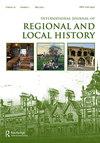“英国最黑暗的城镇”:1914 - 1919年赫尔的爱国主义和反德情绪
Q2 Arts and Humanities
International Journal of Regional and Local History
Pub Date : 2017-01-02
DOI:10.1080/20514530.2017.1353770
引用次数: 4
摘要
摘要本文主要致力于为第一次世界大战文化史上蓬勃发展的运动做出贡献,以提供丰富的地方案例研究,从而对爱国主义战争应对的传统观点提出质疑。它认为,在赫尔,当地人的压倒性反应是一种“防御性”或“务实的爱国主义”。那些证明加入颜色的人心目中最重要的是亲朋好友的安全、当地文化和“生活方式”,而不是捍卫“国王和国家”这一更抽象的概念。尽管后者在表达反德情绪和更广泛地对待战争的态度方面确实发挥了作用,但它更多地与赫尔生活经历中的“当地特点”相结合。即使是对归化德国胡伦人的住宅和企业的暴乱和犯罪袭击,也可能是对城市防御的间接表达,尤其是在靠近北海的港口。本文章由计算机程序翻译,如有差异,请以英文原文为准。
“The Darkest Town in England”: Patriotism and Anti-German Sentiment in Hull, 1914–19
ABSTRACT This article is primarily concerned with contributing to the burgeoning movement within First World War cultural history to provide rich local case studies, in order to problematise traditional perspectives on the patriotic response to war. It argues that, in Hull, the overwhelming response of local people was a sort of “defensive” or “practical patriotism”. The safety of kith and kin, local culture and “way of life” was foremost in the minds of those attesting to join the colours, rather than the more abstract notion of defending “King and Country”. Though the latter certainly played its role in expressions of anti-German feeling and in attitudes to the war more broadly, it was more often combined with “local specificities” taken from the experience of life in Hull. Even riotous and criminal attacks upon the homes and businesses of naturalised German Hullensians could be oblique expressions of concern for the defence of the city, especially pertinent in a port in close proximity to the North Sea.
求助全文
通过发布文献求助,成功后即可免费获取论文全文。
去求助
来源期刊

International Journal of Regional and Local History
Arts and Humanities-History
CiteScore
0.30
自引率
0.00%
发文量
10
期刊介绍:
The International Journal of Regional and Local History aims to publish high-quality academic articles which address the history of regions and localities in the medieval, early-modern and modern eras. Regional and local are defined in broad terms, encouraging their examination in both urban and rural contexts, and as administrative, cultural and geographical entities. Regional histories may transcend both local and national boundaries, and offer a means of interrogating the temporality of such structures. Such histories might broaden understandings arrived at through a national focus or help develop agendas for future exploration. The subject matter of regional and local histories invites a number of methodological approaches including oral history, comparative history, cultural history and history from below. We welcome contributions situated in these methodological frameworks but are also keen to elicit inter-disciplinary work which seeks to understand the history of regions or localities through the methodologies of geography, sociology or cultural studies. The journal also publishes book reviews and review articles on themes relating to regional or local history.
 求助内容:
求助内容: 应助结果提醒方式:
应助结果提醒方式:


